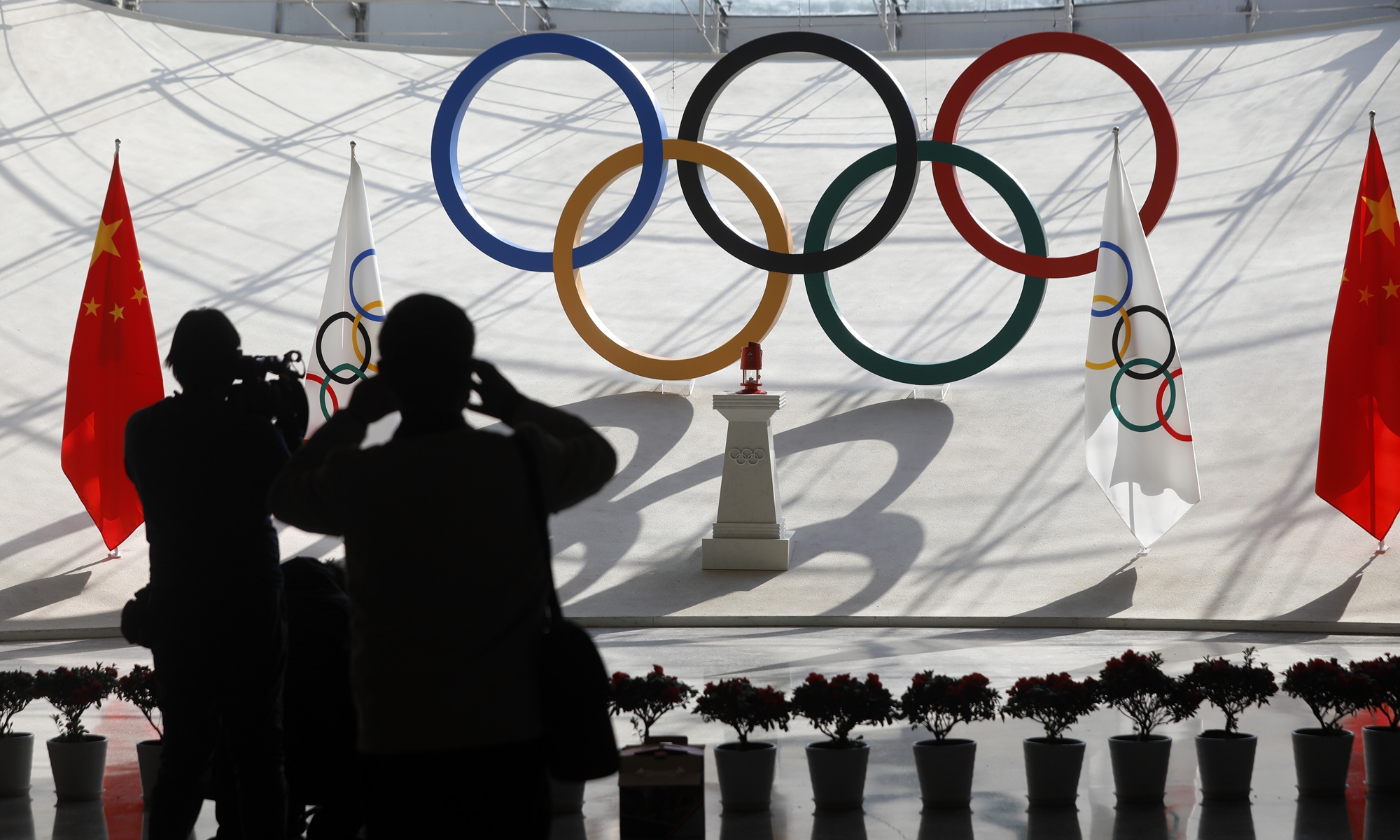
Visitors take pictures of the flame of the Beijing 2022 Winter Olympic Games displayed at the Olympic Tower near the "Bird's Nest" National Stadium in Beijing on October 23, 2021. The public will be able to book tickets to visit the flame, which landed in Beijing on October 20 from Athens, Greece. Photo: VCG
Two days after US President Joe Biden confirmed that Washington was "considering" a diplomatic boycott of the Beijing Winter Olympic Games, The Times reported Saturday that "Boris Johnson ponders boycott of China's Winter Olympics… in protest at China's record on human rights." Such rhetoric makes people wonder whether the Olympic Games is an arena to pursue "faster, higher, stronger - together," or an occasion to showcase which country can receive more worldwide politicians."There is an 'active discussion' in government about whether Britain should follow [the US'] suit, with Liz Truss, the foreign secretary, said to be in favor," The Times' report claimed. The article said that one of the UK's options is that British ministers would not attend the Games, although the ambassador to China would. "This week five Tory politicians wrote to Johnson urging him to ban any official UK diplomatic representation at the Winter Olympic Games in February," the report continued.
Strictly speaking, a boycott of the Olympic Games means banning all of its country's athletes from participation. "Diplomatic boycott" is a roughly man-made new concept by Western politicians, meaning no ban on athletes, but government officials would not attend, Shen Yi, a professor at the School of International Relations and Public Affairs of Fudan University, told Global Times.
Athletes are supposed to be the most crucial players in the Games, not political figures. The only connection between politicians and the sporting event is they may attend the opening and closing ceremonies. Their attendance can further light up the already impassioned atmosphere, but no more. Wouldn't we still call the event the Olympic Games even if leaders of a few countries won't show up? Was the Games ever designed as a show for government officials? Of course not. "Whoever hypes the boycott from the Western world, they are being a drama queen, attempting to steal the thunder," Shen commented.
In most parts of the world, the pandemic is far from being controlled. The attendance of foreign representatives at the Opening Ceremony of the Olympic Games is thus already limited. Take the opening ceremony of the Tokyo Summer Olympic Games. Leaders of around 15 countries and international organizations attended.
French President Emmanuel Macron and Mongolian Prime Minister Luvsannamsrai Oyun-Erdene were the only two heads of states there, and Macron went because France will host the 2024 Paris Olympic Games.
So if any politician considers his or her possible attendance at the Winter Olympic Games as a favor to Beijing or a bargaining chip to pile pressure on China while seeking more interests, they will just make themselves look speculative and egocentric.
When The Times said the UK "ponders" the boycott, it only illustrates that London's attitude toward boycotting the Games is very ambiguous. The UK has been "pondering" for the case for months. The loudest voices usually came from a few politicians, including Conservative MPs Tim Loughton, Tom Tugendhat, and now reportedly the foreign secretary.
Downing Street is obviously more cautious as it has not yet made an official statement. Not to mention in February, Johnson called himself a "fanatic pro-China faction" and rejected calls to boycott the 2022 Winter Olympic Games over Xinjiang affairs.
Johnson did so because he shoulders the greatest responsibility of the UK. Other politicians, without this responsibility, can seek political benefits effortlessly by smearing China. Since an anti-China political atmosphere has already been formed, being outspoken against China has become the easiest way to catch eyeballs and win political gains, according to Shen.
This is also a standard operation of the West. Just like how they hyped the humanitarian crisis in Darfur, Sudan and connected it with 2008 Beijing Olympic Games. "The more the West is in decline, the more eager they are to stir up something to convince the world they are still mighty," Shen said.
After Brexit, the UK has positioned itself as "Global Britain." It is anxious to reach the vision, boost its worldwide influence and once again set up its image as the No.2 power in the capitalist world, so as to prove its divorce from the EU was the right move. Speaking out in certain sensitive political issues, or worse, crafting a publicity stunt, has thus become an approach to manifest its influence, Wang Zhanpeng, a professor from the British Studies Center of Beijing Foreign Studies University, told Global Times.
Nevertheless, following the US in provoking China will not bring the UK any practical benefits. London needs to figure out it still has the option to make money from the Chinese market, yet "irritating China is jeopardizing Britain's own wallet," commented Shen.
As for whether British officials will come to the Games, the Chinese people are confident and open minded enough not to care. We welcome athletes wherever they are from, not the provoking politicians.


